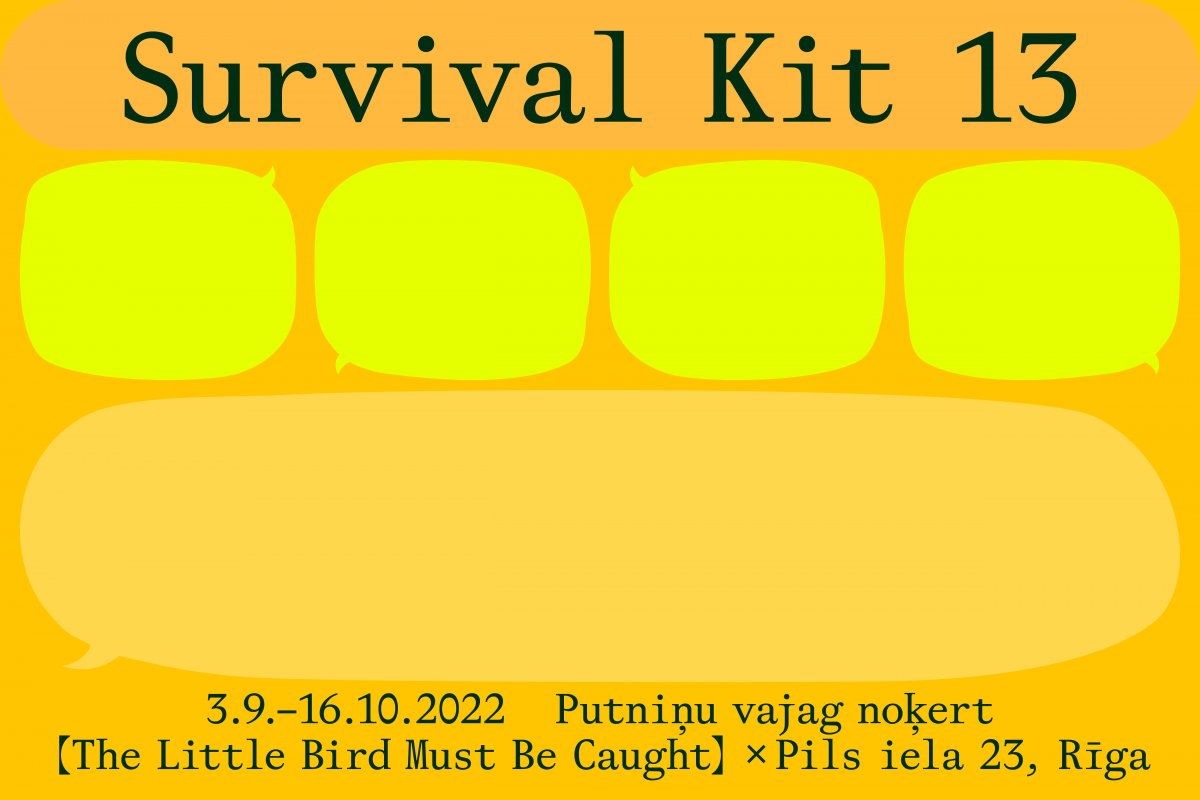
"The little bird must be caught"
3rd of September -16th of October, 2022
Curated by iLiana Fokianaki
Venue: Pils iela 23, Riga
In the dark times
Will there also be singing?
Yes, there will also be singing.
About the dark times.”
Bertolt Brecht, Svendborg Poems, 1939
The upcoming edition of Survival Kit 13, is conceived by curator iLiana Fokianaki, and takes as its form of departure the cultural imprint of the Russian occupation of Latvia. The exhibition is titled The little bird must be caught, and is inspired by the homonymous title of a poem by Latvian poet Ojārs Vācietis, known and loved in the country not only for his literary talent, but also for his courage in discussing the political conditions of his time. His work addressed the oppression of the Soviet regime, but also spoke about global social issues, from his native Latvia. The poem written during the latter period of the Soviet Union in the late ‘70s during Brezhnev’s rule, warns of the dangers of letting the little bird free to sing, hatch its eggs and continue being. It is an ironic allegory, in favour of free speech and against authoritarianism and repression. The poem reads urgent and timely, in a global reality where free speech and self-determination are threatened by far-right nationalism and authoritarianism. The exhibition, originally conceived in October 2021, has now a new urgency, given the brutal war launched against the Ukrainian people by what Fokianaki terms the “narcissistic authoritarian statism” of Putin’s rule.
Following the thematic of The little bird must be caught, the curator and her team chose for Survival Kit 13 to be held this year in the historic center of Riga, the backdrop for the marches and demonstrations for what became known as the “Singing Revolution” (dziesmotā revolūcija). It was this peaceful four-year-long uprising from 1987 to 1991, that would lead to the restoration of independence of the Baltic states of Estonia, Latvia, and Lithuania from the Soviet Union, marking the end of the Cold War. Latvia is famous for the hundreds of “dainas”—traditional folk songs—also inspiring and informing the exhibition.
The little bird must be caught focuses on how sound, music, voice, the sonic, utterance have played a role throughout human history in defining, marking, contouring and characterizing historical moments of emancipation: actions against repression and authoritarianism, the relationship of sound to freedom of speech, the power of the voice and the role of the sonic in resistance, revolution and self-determination. The works presented discuss, consider and address, the role of art in historical and contemporary modes of self-determination, resistance with an emphasis on music and the sonic as forms of peaceful protest, declarative gestures and collective performativity.
These enquiries aim to further connect with the aftermath of the global pandemic, that changed our sonic landscapes and made felt the role of sound when the world’s slowing down meant a new-found, numbing silence. Simultaneously, it made clear that even in times of health crisis, injustice cannot be silenced, as demonstrated by the global movement of Black Lives Matter that filled the streets, the ears and the minds with slogans about freedom, equality and social justice, the global manifestations of a revived environmental movement, that made us listen beyond the human centred perspective of the world, and the recent solidarity marches for the people of Ukraine in anti-war demonstrations the world over.
Fokianaki has a compelling record of group and solo exhibitions and research projects in institutions worldwide. The founder and director of State of Concept Athens since 2013, she has changed the landscape of the Athenian art scene, bringing to the capital of Greece exhibitions of artists such as Basim Magdy, Laure Prouvost, Sanja Iveković, Forensic Architecture, Kader Attia, Metahaven, Kapwani Kiwanga. She has curated exhibitions for international institutions such e-flux New York, La Colonie, KADIST Paris, Kunstinstituut Melly Rotterdam, Museum of Contemporary Art Ljubljana and has curated public programs for Vera List Center for Art and Politics, Het Nieuwe Instituut a.o. She is currently co-curating a group exhibition for Reina Sofia Museum Madrid and preparing a group show for Framer Framed Amsterdam, both to be realised in 2023. Fokianaki is a lecturer at the Dutch Art Institute, and has lectured in academies, independent spaces, museums, and foundations worldwide. She publishes regularly in journals such as e-flux, Frieze, among others, and has participated in several publications. Her book “Gossips: WomXn Gather” will be published in 2023.
Participating artists: Forensic Architecture, Andrius Arutiunian, Sammy Baloji, Rufina Bazlova, Candice Breitz, Juris Boiko and Hardijs Lediņš, Vera Chotzoglou, Sanja Ivekovic, Kapwani Kiwanga, Chrysanthi Koumianaki, Rojava Film Commune, Ansis Epners, Kristaps Epners, Dora García, Almagul Menlibayeva, Marina Naprushkina, Ahmet Öğüt, Antonis Pittas, Susan Philipsz, Laure Prouvost, Tabita Rezaire, Mykola Ridnyi, Krišs Salmanis, Erica Scourti, Indrė Šerpytytė, Sabīne Šne, Maryam Tafakory, Wu Tsang, Raed Yassin, Valdis Villerušs, Anton Vidokle.
Supported by: Kultūras Ministrija, Rīgas Dome, VKKF, Goethe Institut, Mondriaan, Neon, LIAA, US Embassy Riga, Embassy of Greece, Adenauer Stiftung, LATIO, Homo Novus Festival, Satori, Barikāžu muzejs, Arctic Paper, Dasko, Kvadro, Labas Preces, Latvijas Nacionālais teātris, LNMM, Zuzeum, Tikkurila, VIVACOLOR Valdemāra Interior Outlet, Mogotel Hotel group, Neiburgs, Abavas vīna darītava, Bārs Auss, Kokmuiža, Rizhskiy Samagon, Zelteris, Echo Gone Wrong, Live Riga, Rīgas Laiks, Riga This Week, Arts of the Working Class, Punctum, Dovzhenko Centre